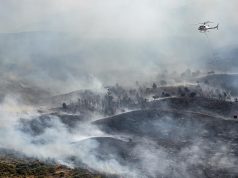Findings show even stronger association for more vulnerable older adults
By Lori Solomon HealthDay Reporter
TUESDAY, July 8, 2025 (HealthDay News) — Wildfire smoke exposure over time may increase the risk for heart failure, according to a study published in the July issue of the Journal of the American College of Cardiology.
Hua Hao, Ph.D., from the Rollins School of Public Health at Emory University in Atlanta, and colleagues investigated the association between long-term exposure to fire smoke-specific fine particulate matter (PM2.5) and incident heart failure compared to nonfire PM2.5. The analysis included data from 22 million fee-for-service Medicare enrollees (2007 to 2018).
The researchers found that for each 1-μg/m3 increase in the past two-year average smoke PM2.5, the risk for heart failure was increased by 1.014 percent compared with nonsmoke PM2.5 (hazard ratio, 1.005). Annually, this association corresponded to an estimated 20,238 additional heart failure cases among older U.S. adults. During the past two years, the number of days exposed to smoke PM2.5 >1 μg/m3 or >2.5 μg/m3 were both significantly associated with a heightened heart failure risk. Susceptibility to smoke PM2.5-linked heart failure was stronger in women, Medicaid-eligible individuals, and those living in lower-income areas.
“As wildfire smoke becomes more frequent and intense, we are learning that even small, long-term exposures can raise the risk of heart failure, especially among the most vulnerable,” Harlan M. Krumholz, M.D., editor-in-chief of the Journal of the American College of Cardiology, said in a statement. “These findings elevate the urgency of protecting communities through both environmental policy and health care preparedness.”
Abstract/Full Text (subscription or payment may be required)
Copyright © 2025 HealthDay. All rights reserved.








